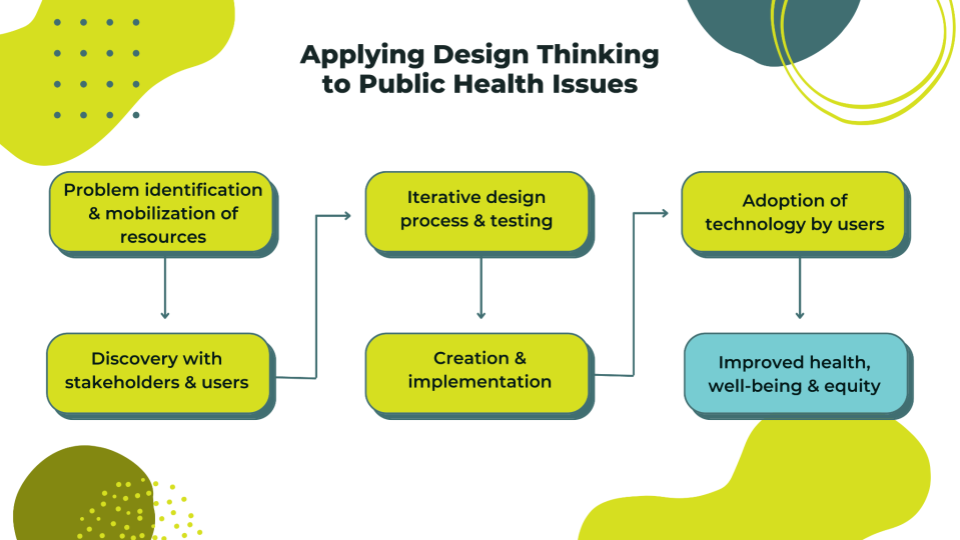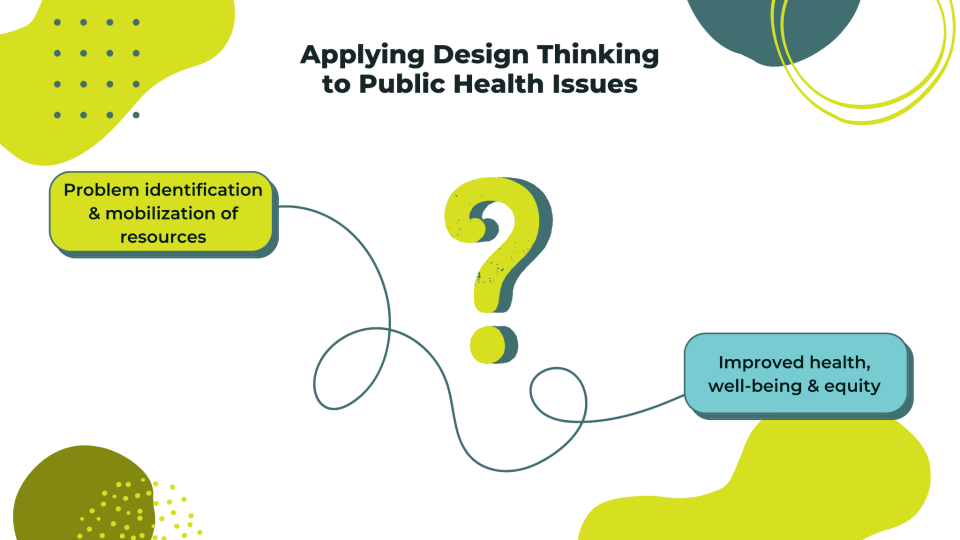This week, Community Commons joined the American Public Health Association and the Alliance for Disease Prevention and Response at APHA’s 2022 Annual Meeting and Expo to share more about the Public Health and Equity Resource Navigator, or PHERN. PHERN is a free, publicly-accessible tool that helps changemakers navigate 1,000+ resources focused on ending the pandemic, advancing equity, and building a resilient, robust, sustainable public health system for the future.
PHERN amplifies public health and equity efforts through design thinking, knowledge management, and coalition building around key issues and in a way that fosters equity.
Technology and Design Thinking In Public Health
Technology has the power to extend and expand the work of organizations, communities, coalitions, and the public health sector itself by supporting changemakers and stakeholders, making learnings more accessible, amplifying best practices, increasing collaboration, and building momentum for public health and equity.
Design thinking is an approach to problem solving that maximizes creative, human-centered solutions within technological and economic constraints. By applying design thinking to public health issues, we can leverage emerging technologies to move from idea to outcome. We begin by identifying an issue that needs attention, and mobilizing resources to address it. We must then engage stakeholders and users, design, test, and develop and implement a solution. Adoption of the new technology should drive tangible improvements in health, well-being, and equity. At its core, leveraging design thinking in public health means creating synergy between what is technologically possible and what is possible in the hearts and minds of changemakers and communities.
In public health, leveraging design thinking means creating synergy between what is technologically possible and what is possible in the hearts and minds of changemakers and communities.

Eager to leverage technology for public health improvement in the context of COVID-19, the APHA and the Alliance for Disease Prevention and Response partnered with the Institute of People, Place, and Possibility—the stewards of Community Commons—to develop PHERN. Moving through the design thinking process together, we curated over 1,000 resources, organized them by key topics and sectors, developed robust search and browsing capabilities, and created a blog-like feature to highlight resources, events, and partners.
Knowledge Management as a Public Health Solution
When we first conceptualized PHERN, we had two core issues to address:
1. The internet is flooded with complex, conflicting, and questionable resources about COVID-19 and other public health topics.
2. Countless amounts of time, money, and creative energy are spent by organizations hoping to address this issue, but often solutions are duplicative and we end up with overlapping resource libraries and reading lists, which are difficult to maintain and quickly become outdated.
Knowledge management—the systematized process of ensuring knowledge is accessible, complete, and usable—offers a direct solution to improve the use, quality, and equitable dissemination of public health information and resources. In our experience working with changemakers, however, we find that traditional approaches to knowledge management (like listservs, intranets, and resource webpages that aren’t collaborative or kept up-to-date) are ineffective in complex, multi-sector community change work. Transformative change requires transformative knowledge. In today’s context, that means developing and maintaining knowledge ecosystems that are digitally discoverable, consistently updated, easily shareable, and organized into the most efficient, intuitive exploration and discovery pathways for key user groups. Our solution? Community Commons Spaces.
Spaces are custom-designed web-based platforms that package and provide access to hand-curated resources from the powerful and ever-growing Community Commons Knowledge-base. Spaces like PHERN help cultivate shared learning and community change through knowledge management and coalition-building. PHERN’s knowledge management and community learning capabilities also create shared language and values, helping to catalyze collective action.
Coalition Building as a Public Health Solution
Central ingredients of successful knowledge management include sourcing, vetting, and maintaining resources and content, as well as gaining buy-in from users and ensuring equity is built into knowledge systems from the ground up. In public health knowledge management projects like PHERN, bridging diverse perspectives and organizing people is just as important as organizing knowledge. Coalition-building—the process of bringing groups together to achieve a shared goal—is a key strategy for equitably advancing public health knowledge and supporting technologies.
Leveraging its extensive network of Alliance partners, PHERN is fueled by the people it was built to serve. PHERN’s interactive Network Map allows users to quickly visualize, explore, and contribute to the movement for public health and equity. By combining the strategies of coalition-building and knowledge management, network mapping demonstrates how design thinking creates synergy between emerging technologies and community change. Click here to explore the Network by initiatives, organizations, and associated topics, or browse the full list of Alliance network partners.
Leveraging its extensive network of Alliance partners, PHERN is fueled by the people it was built to serve.

Latest PHERN Updates
Today, PHERN helps spread good science about public health issues and measures, supports assessment of health impacts, advances health equity, promotes modernization, transformation, and resilience, and shares strategies, stories, and resources.
Learn more about PHERN, browse resources, and explore new topics by clicking through the links below. PHERN is regularly updated with new resources, new topics, new blog posts, refreshed pages, and new network members. Be sure to subscribe for updates and check back often.
New Topics
Community Assessment and Engagement
Community assessment is a systematic process by which a community’s health status and related factors are examined; it is used to identify problems and assets in a community. Through community engagement, stakeholders work together to address health-related issues and promote well-being with the goal of improving health outcomes. These two processes work hand-in-hand to facilitate health improvements. COVID-19 has changed the assessment landscape in many ways–introducing new challenges for engagement, upending pre-pandemic implementation plans, and necessitating new and updated data to understand emerging health impacts and needs.
Supporting Public Health and Frontline Workers
The COVID-19 pandemic has put immense pressure on frontline and public health workers, exacerbating myriad mental health concerns, including stress, depression, and burnout. As with COVID-19 itself, impacts have disproportionately affected certain populations more likely to hold frontline positions, including women, LatinX people, and people of color. These challenges, compounded with broader issues affecting the workforce, undermine the capacities of frontline and public health workers to provide essential services. Key strategies for supporting frontline and public health workers include building a culture of caring across leadership and organizations, improving employment practices and working conditions, and fostering social support among workers.
The latest public health &
equity content
Straight to your inbox

